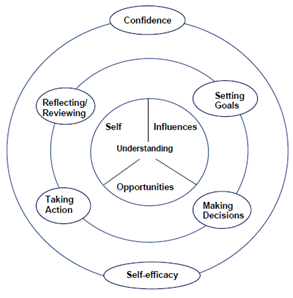The Merging of Theory, Research and Practice to Develop a Suite of Scales
07/07/2022
Col McCowan OAM is the Director of Cromach Careers. He is a registered psychologist, educator and counsellor who has extensive experience working with individuals, systems and countries in secondary and tertiary education fields, in governments at strategic and policy levels, and as a consultant / project manager.

I developed four Career Education and Development Scales (CEDS) which could provide students with formative self-assessment opportunities, facilitate practitioners’ participation in evidence-based practice and assist administrators with managing resources and developing policies. The four scales are:
CEDS – Primary 12 items for students in Grades 5 & 6
CEDS – Junior 18 items for students in Grades 7, 8 & 9
CEDS - Senior 24 items for students in Grades 10, 11 & 12
CEDS – Tertiary 27 items for all students in post-secondary educational setting
All Scales reflect the nine components in the revised Career Education and Development (CED) model and the CED curriculum framework (CEDF; McCowan et al.) The items were based around ones from other existing scales and the activities in the 45 lesson plans in the CEDF and were reviewed by students, parents and career practitioners.
The model/framework has been developed from theory, especially Career Development Theory (Super, Ginsburg), Social Cognitive Career Theory (Lent, Brown & Hackett) and Systems Theory (Patton & McMahon) and extensive research, especially by Marciniak et al. and Larson et al., together with the practitioner’s perspective from Dr Alan McAlpine, Lyn Nguyen, Mansi Shah and Lucia Ciccarone. See diagram.

Career Education and Development Model/Framework
Understanding: Self, Influences and Opportunities
Actions: Setting goals, Making Decisions, Taking action, Reflecting/Reviewing
Attitudes: Self-efficacy and Confidence
The three school-based Scales were trialed in Study 1 with students from four schools across Australia. Students from a variety of schools and colleges in the ACT Education Directorate were involved in Studies 2 and 3. With help from Professor Peter McIlveen at USQ, each of the Scales has undergone intensive analysis to affirm the 9-factor model and provide assurance that they each have concurrent validity and can be used across grades and genders with confidence.
With my support and permission, the Education Directorate of the ACT Government has taken the three school-based scales and embedded them in their Career Pathways Portal. After students complete them on-line, they get an individual report and the data is collated to provide reports for each school involved and Directorate staff.
The data we collated in Study 2 and 3 provided the Directorate staff with informative data on age, grade and gender differences, for example. This was invaluable to report back to the school career practitioners who could then address any issues with students and in future programs. School administrators seemed to appreciate the Scales and look forward to them being used by their students when they complete their Career Pathways Program later this year.
One interesting finding was the importance of the Attitudinal Factors (Confidence and Self-efficacy) in predicting the outcomes and expectations of the students. How we teach or address their career education and development needs, seems to be more important than what we teach or the actions we require of them.
We have explored the use of translated scales in Vietnam and the subsequent research has also affirmed the 9-factor structure and their concurrent validity.
The Scales have been made available in www.cromachcareers.com. I am currently working on developing an automated system for use in schools but it is not ready yet. Practitioners wanting to use the scales should contact me at [email protected].